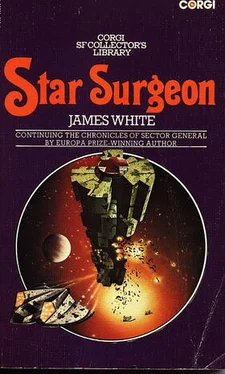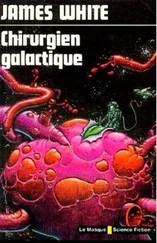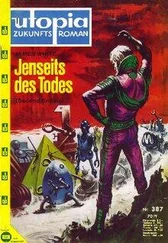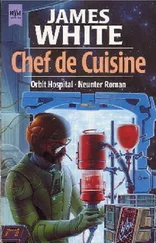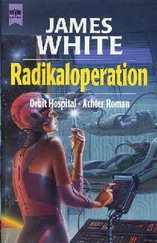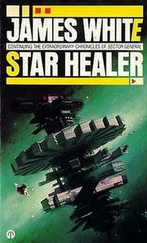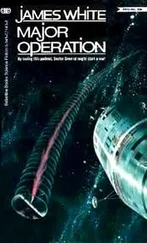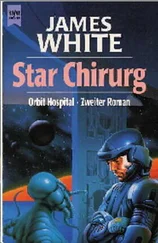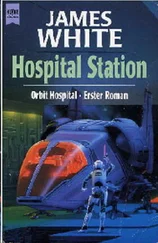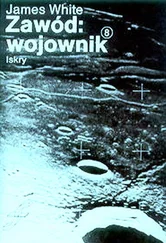they aren’t suitable. The doctors left to us are either very junior interns or Corps medical officers and e-ts who came with the volunteer forces. None of them have experience with multiple physiology tapes. It would render them permanently insane within the first hour.
“As for the girls,” he went on, a sardonic edge in his voice, “you have noticed by this time that the female Earth-human DBDG has a rather peculiar mind. One of its peculiarities is a deep, sex-based mental fastidiousness. No matter what they say they will not, repeat not, allow alien beings to apparently take over their pretty little brains. If such should happen, severe mental damage would result. No again. Off.”
Conway resumed his tour. It was beginning to get him down now. Even though his technique was improving the process of Translation was an increasing strain. And in the relatively easy periods between translations he felt as if there were seven different people all arguing and shouting inside his brain, and his own was very rarely the loudest voice. His throat was raw from making noises that it had never been designed for, and he was hungry.
All seven of him had different ideas for assuaging that hunger, revoltingly different ideas. Since the hospital’s catering arrangement had suffered as badly as everything else there was no wide selection from which he could have picked neutral items that would not have offended, or at least not completely nauseated, his alter egos. He was reduced to eating sandwiches with his eyes shut, in case he would find out what was in them, and drinking water and glucose. None of him objected to water.
Eventually an organization for the reception and treatment of casualties was operating again in all the habitable levels-it was slow, but it was operating. And now that there were facilities for treating them Conway’s next job was to move the patients who were currently jamming the approaches to the airlocks. There were actually pressure-litters anchored to the outer hull, he had been told.
Prilicla objected.
For a few minutes he tried to find out why. One of Prilicla’s objections was that Conway was tired, which he countered by telling it that everybody in the hospital, including Prilicla itself, was tired. The other objections were either too weak or too subtle for the limited communications available. Conway ignored them and headed for the nearest lock.
The problems here were very similar to those inside the hospital- the major disadvantage being his spacesuit radio which hampered translation considerably. But to offset this he could get around much more quickly. The tractor beam men who handled the wrecks and wreckage around the hospital could whisk his whole party from point to point within seconds.
But he discovered that the Melfan segment of his mind, which had been seriously troubled by the weightless conditions inside the hospital, was utterly terrified outside it. The Melfan ELNT who had produced the tape had been an amphibious, crab-like being who lived mainly under water and had had no experience whatever of space. Conway had to fight down the panic which threatened his whole, multi-tenanted mind as well as the fear which all of him felt at the battle going on above his head.
O’Mara had told him that the attack was easing off, but Conway could not imagine anything more savage than what he was seeing.
Between the warring ships no missiles were being used — the attackers and defenders were too condensed, too inextricably tangled up. Like tiny, fast-moving models, so sharply defined that he felt he could reach up and grab one, the ships wheeled through their wild, chaotic dance. Singly and in groups they lunged, whirled, took frantic evasive action, broke formation or had their formations broken, reformed and attacked again. It was endless, implacable and almost hypnotic. There was, of course, no noise. What missiles were launched were directed at the hospital, a target too big to miss, and they were felt rather than heard.
Between the ships, tractor and pressor beams jabbed out like solid, invisible fingers, slowing or deflecting the target ship so that a rattler could be focused. Sometimes three or more vessels would converge on a single target and tear it apart within seconds. Sometimes a well-directed rattler would rip apart the artificial gravity system an instant before it disrupted the drive. With the crew hammered flat by high acceleration the ship would go tumbling out of the fight, unless someone put another rattler on it or a tractor man on Sector General’s hull pulled it down to look for survivors.
Whether or not there were any survivors the wreck could be used …
The once smooth and shining hull was a mass of deep, jagged-edged craters and buckled plating. And because the missile lighting did strike twice, or even three times, in the same place-that was how the Translator computer had been destroyed — the craters were being plugged with wreckage in an effort to keep the missiles from exploding deeper inside the hospital. Any type of wreckage served, the tractor men weren’t choosy.
Conway was on a tractor-beam mount when one of the wrecks was pulled in. He saw the rescue team shooting from the shelter of the airlock, circle the hulk carefully, then enter. About ten minutes later they came out towing … something.
“Doctor,” said the NCO in charge of the installation, “I think I goofed. My men say the beastie they’ve pulled out of that wreck is new to them and want you to have a look. I’m sorry, but one wreck is like any other wreck. I don’t think it is one of ours …
Six parts of Conway’s mind contained personalities whose memories did not contain data on the war and they did not think it mattered. As the minority opinion Conway didn’t think it mattered either, but he knew that neither the sergeant nor himself had time to start an ethical debate on it. He had a quick look, then said, “Take it inside. Level Two-forty, Ward Seven.”
Since being given the tapes Conway had been forced to watch helplessly while patients-casualties whose condition was such that they merited a fully qualified Senior Physician at least to perform the surgery-were operated on by tired, harassed, but well-intentioned beings who just did not have the required skill. They had done the job as best they could because there was nobody else to do it. Conway had wanted to step in many times, but had reminded himself and been reminded by Prilicla and the rest of his entourage, that he had to consider the Big Picture. Reorganizing the hospital then had been more important than any one patient. But now he felt that he could stop being an organizer and go back to being a doctor.
This was a new species to the hospital. O’Mara would not have a tape on its physiology, and even if the patient recovered consciousness it would not be able to cooperate because the Translators were dead. Conway had got to take this one and nobody was going to talk him out of it.
Ward Seven was adjacent to the section where a Kelgian military doctor and Murchison had been working wonders with a mixed bag of FGLI, QCQL and Earth-human patients, so he asked them both to assist. Conway put the new arrival’s classification as TRLH, being aided in this by the fact that the patient’s spacesuit was transparent as well as flexible. Had the suit been less flexible the being’s injuries would have been less severe, but then the suit would have cracked instead of bending with the force which had smashed against it.
Conway bored a tiny hole in the suit, drew off a sample of the internal atmosphere and resealed it. He put the sample in the analyzer.
“And I thought the QCQLs were bad,” said Murchison when he showed her the result. “But we can reproduce it. You will need to replace the air here, I expect?”
Conway said, “Yes, please.”
Читать дальше
